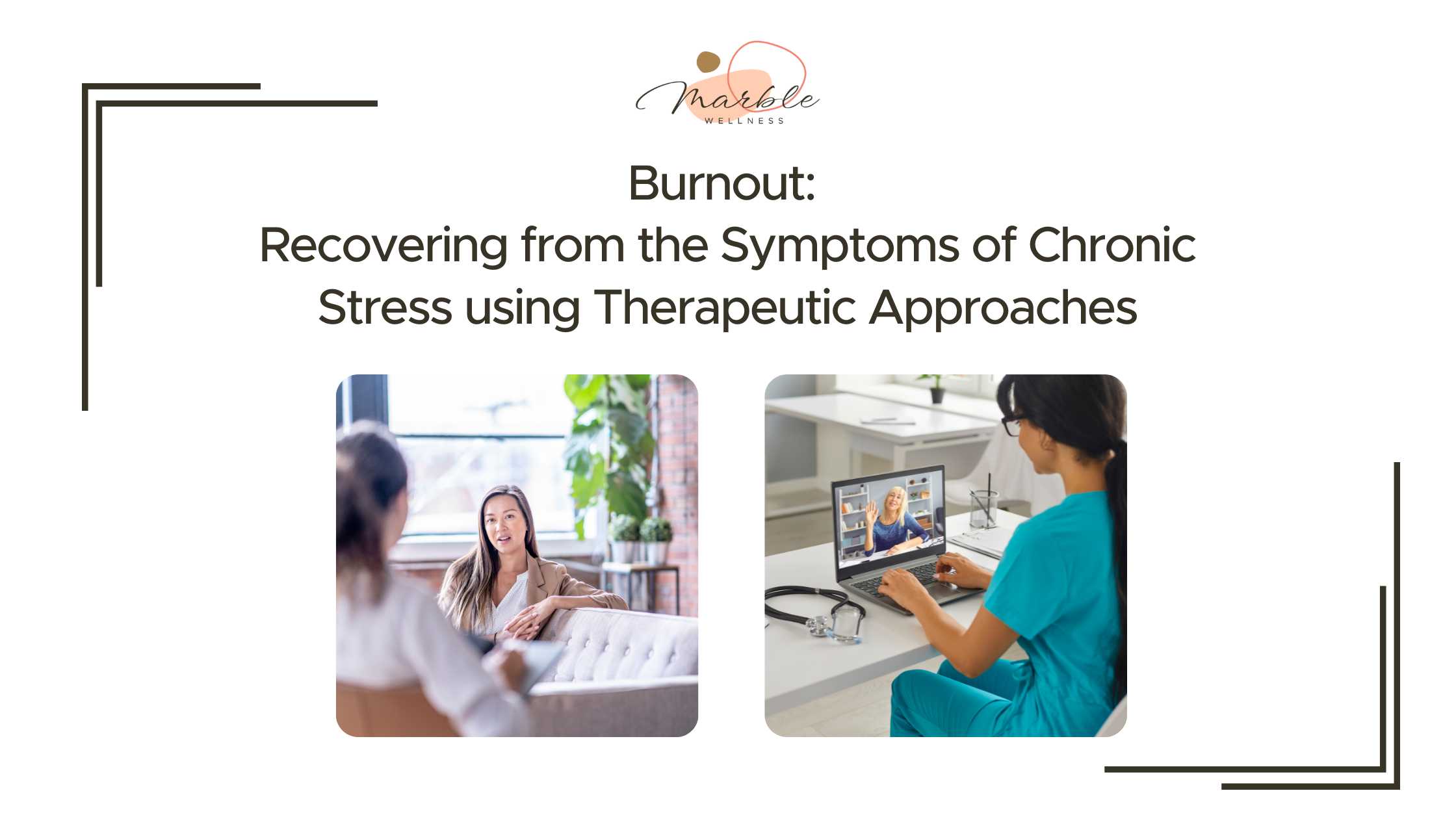Burnout has become increasingly common in today’s fast-paced and demanding world. Many factors contribute to this widespread issue, including high workloads, long hours, and the pressure to constantly perform and achieve. Advances in technology have blurred the boundaries between work and personal life, making it difficult for individuals to disconnect and recharge. Additionally, the competitive nature of many industries, along with a culture that often values productivity over well-being, exacerbates stress levels. These conditions create a perfect storm where sustained stress leads to burnout, affecting people across various professions and walks of life. As a result, many individuals find themselves feeling overwhelmed, exhausted, and unable to cope with the relentless demands placed upon them.
Several therapeutic approaches can be beneficial for addressing burnout, and the choice often depends on individual preferences and the specific factors contributing to burnout.
Here are some types of therapy that are commonly helpful to address burnout:
- Cognitive-Behavioral Therapy (CBT):
- Focus: CBT helps individuals identify and change negative thought patterns and behaviors. It can be effective in addressing unhelpful thinking patterns and developing healthier coping strategies for managing stress.
- Mindfulness-Based Stress Reduction (MBSR):
- Focus: MBSR incorporates mindfulness meditation and awareness techniques. It helps individuals cultivate a present-moment focus, reducing stress and promoting overall well-being.
- Solution-Focused Brief Therapy (SFBT):
- Focus: SFBT is future-oriented and goal-focused. It helps individuals identify solutions and set achievable goals, promoting a positive outlook and a sense of empowerment.
- Psychodynamic Therapy:
- Focus: Psychodynamic therapy explores unconscious processes and early life experiences. It can be helpful in understanding underlying causes of burnout and addressing deep-seated patterns contributing to stress.
- Narrative Therapy:
- Focus: Narrative therapy examines the stories individuals tell about their lives. It helps reshape these narratives, fostering a more positive and empowering perspective, which can be particularly helpful for reframing experiences contributing to burnout.
- Dialectical Behavior Therapy (DBT):
- Focus: DBT is often used for individuals experiencing intense emotions and stress. It combines cognitive-behavioral techniques with mindfulness, helping individuals regulate emotions and improve interpersonal effectiveness.
- Humanistic Therapy:
- Focus: Humanistic therapies, such as Person-Centered Therapy, focus on self-exploration and personal growth. They can be beneficial for individuals seeking a deeper understanding of their values, purpose, and direction in life.
- Interpersonal Therapy (IPT):
- Focus: IPT addresses interpersonal issues and relationships. It can be helpful for individuals struggling with work-related stress, conflicts, or challenges in their personal relationships.
- Acceptance and Commitment Therapy (ACT):
- Focus: ACT encourages individuals to accept their thoughts and feelings rather than fighting against them. It emphasizes living in a way that aligns with one’s values, promoting psychological flexibility.
- Group Therapy:
- Focus: Group therapy provides a supportive environment where individuals facing burnout can share experiences, gain insights, and receive feedback from others. It fosters a sense of community and reduces feelings of isolation.
It’s essential to note that therapy for burnout is often multifaceted, and a combination of therapeutic approaches might be most effective. Additionally, a strong therapeutic alliance between the individual and the therapist is crucial for success. A skilled burnout therapist can tailor the approach to the unique needs and preferences of the individual, creating a supportive and collaborative environment for burnout recovery.
Who Can Help With Burnout Recovery?
Burnout recovery often benefits from a collaborative approach involving various professionals who specialize in different aspects of well-being. Here are types of professionals who can play key roles in supporting burnout recovery:
- Mental Health Therapists:
- Role: Mental health therapists, including psychologists, counselors, and social workers, can provide individual or group therapy to address the emotional and psychological aspects of burnout. They help individuals explore stressors, develop coping strategies, and build resilience.
- Psychiatrists:
- Role: Psychiatrists are medical doctors who specialize in mental health. They can assess whether medication may be beneficial in managing symptoms of anxiety, depression, or other mental health conditions that often coexist with burnout.
- Life Coaches:
- Role: Life coaches can provide guidance and support in setting and achieving personal and professional goals. They often focus on holistic well-being, helping individuals create a balanced and fulfilling life.
- Career Counselors:
- Role: Career counselors assist individuals in evaluating and navigating their professional paths. They can help with career transitions, job satisfaction, and aligning one’s career with personal values.
- Nutritionists/Dietitians:
- Role: Nutritionists or dietitians can contribute to burnout recovery by addressing the impact of diet on energy levels, mood, and overall well-being. A balanced and nourishing diet is essential for physical and mental health.
- Fitness Trainers/Physical Therapists:
- Role: Exercise has proven benefits for mental health. Fitness trainers or physical therapists can create personalized exercise plans to improve physical well-being, reduce stress, and enhance overall resilience.
- Sleep Specialists:
- Role: Adequate sleep is crucial for recovery. Sleep specialists can help individuals address sleep disorders and establish healthy sleep hygiene practices.
- Occupational Therapists:
- Role: Occupational therapists focus on enhancing an individual’s ability to participate in daily life activities. They can provide strategies to manage work-related stress and improve overall occupational well-being.
- Mindfulness Instructors:
- Role: Mindfulness practices, such as meditation and yoga, are effective in managing stress and preventing burnout. Mindfulness instructors can guide individuals in incorporating these practices into their daily routines.
- Human Resources Professionals:
- Role: In a workplace setting, HR professionals play a crucial role in addressing burnout. They can implement policies that support work-life balance, provide resources for employee assistance programs, and create a positive work environment.
- Financial Counselors:
- Role: Financial stress can contribute to burnout. Financial counselors can assist individuals in managing their finances, setting realistic budgets, and creating a plan for financial stability.
- General Practitioners (Family Doctors):
- Role: General practitioners can assess overall health, rule out physical causes for symptoms, and provide referrals to specialists as needed. They play a key role in coordinating care for the various aspects of burnout recovery.
Collaboration among these professionals, tailored to an individual’s unique needs, can create a comprehensive and effective approach to burnout recovery. It’s important to seek support from professionals who align with the specific challenges and goals of the individual experiencing burnout.
Start Burnout Therapy in St. Louis or via Online Therapy in Missouri
Marble Wellness has expert STL therapists to help you find balance and meaning in life, even when you are dealing with burnout and overwhelm. Whether you live in St. Louis, MO for in-person therapy or want to connect virtually with online therapy in Missouri, we can help. Reach out today to get started!
Contact Us!

Additional Counseling Services at Marble Wellness in St. Louis, MO and Chicago, IL
Counseling services are designed to help set you on a path of living a more fulfilled, calm, and happy life.
St. Louis
Our St. Louis team of therapists has a variety of training backgrounds and areas of expertise. We specialize in anxiety, depression, grief, chronic illness, therapy for men, couples, and maternal overwhelm. Our practice also helps new moms with various postpartum concerns, moms in the thick of parenting, and moms with teens. We can also chat from wherever you are in the state with online therapy in Missouri and online therapy in Illinois. No matter where you are in your journey, we would love to support you.
Chicago
Our Chicago team of therapists offers a wide range of mental health services to help our clients through the different challenges and hurdles in their lives. In addition to anxiety, depression, grief, therapy for men, and maternal overwhelm, we specialize in professional burnout, therapy for breakups, and love partnering with working moms.



